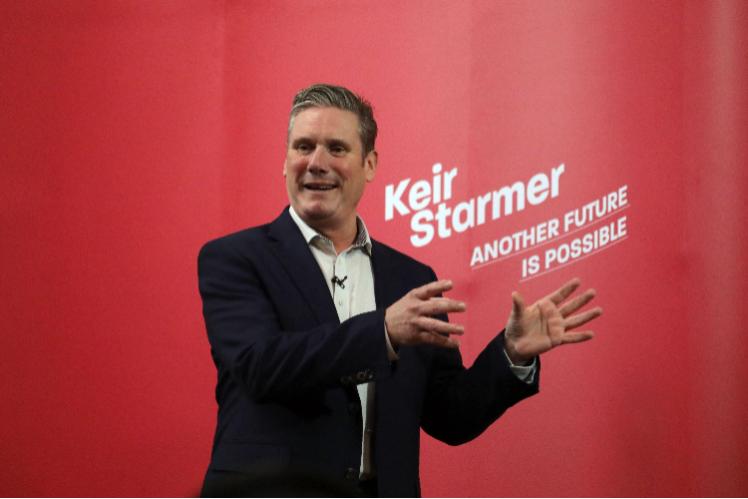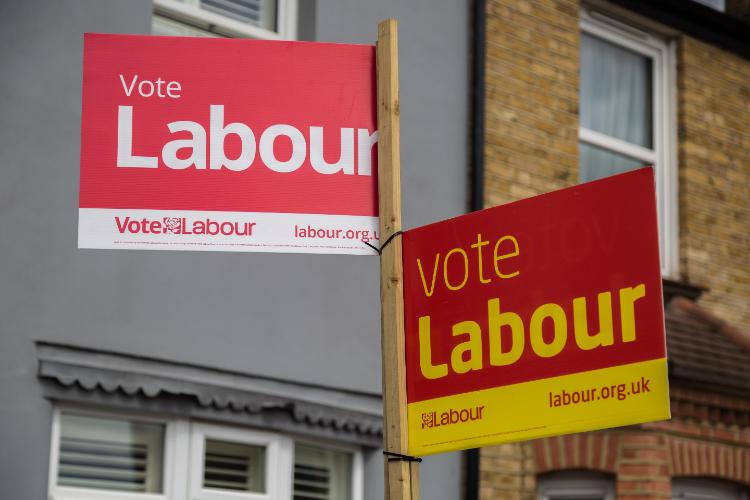Policy promises: How can the Labour Party be defined today?
7 min read
As a general election looms, the Labour Party continues to drop former pledges. Sophie Church considers what kind of party it has become in consequence
Keir Starmer’s website is sparse. From the home page, only one link is available from the drop-down menu. In trying to find Starmer’s pledges – those which may have helped win him the leadership in 2020 – it’s back to a more specific search on Google, leading to a page that seemingly was on his website after all. Go figure.
Starmer promises to maintain Labour’s “radical values” in the introduction to his pledges page. He stands based on “the moral case for socialism”. Read on, and the Labour leader vows to support the abolition of tuition fees, increase income tax for the top five per cent of earners and abolish the House of Lords. There is an option to download each pledge in a red box graphic, with Starmer’s signature in the corner.
These red boxes offer a view into Starmer’s priorities as he was running for leader. But now, some of the pledges contained within have been abandoned, leaving many asking what Starmer, and his party, stand for. So, why the about-turns?
The Tories can’t take advantage of these changes in policy because it cements the idea that Keir is a centrist, and that’s exactly what Keir Starmer wants the public to think
The answer, says Labour peer Lord Liddle, appearing frustrated that the question even be asked, is the economic downturn the country has experienced since Starmer’s leadership campaign. “We are inheriting a desperate economic situation. The Tories have run the economy into the ground in Britain,” he says. “Do people not realise that?”
In the past year, Starmer has confirmed Labour would keep the two-child benefit cap. The party will no longer pump £28bn into the green economy annually but will “ramp up” to that figure by the midpoint of their first term in office. In doing both, Starmer is heading off the attack that his party is fiscally irresponsible, says Labour peer Lord Wood.
“He is being hyper-responsible. And I think he wants his hyper-responsibility to be his great asset. And at the moment, being hyper-responsible is causing him some short-term grief, not just inside Labour… and I think he’s convinced that sticking to that is ultimately going to pay off.”
 Keir Starmer running to be leader of the Labour Party (Credit: Dominic Dudley / Alamy Stock Photo)
Keir Starmer running to be leader of the Labour Party (Credit: Dominic Dudley / Alamy Stock Photo)
While Starmer is presenting himself as a stable hand, he is also dropping policies that may not appeal to voters in the red wall, explains Martin Smith, professor of politics at the University of York.
“Labour is taking for granted the pro-EU, anti-Brexit university cities [and] liberal professions… and thinking ‘OK, they’re not going to vote Conservative, so we don’t need to worry about the policies that are attractive to that group of people – we need to worry about the policies that are attractive to traditional, working-class Labour voters’,” he says. “So, I think the policies they’re abandoning are the policies they see as shoring up the seats they lost… in 2019.”
Lord Wood adds that Labour shying away from more progressive policies leaves the Conservatives unable to land a punch: “The Tories will not want to point out that a lot of things which the public might think of as quite lefty have been moved away from because they’ll want to paint Keir Starmer as quite a left-wing leader. So… the Tories can’t take advantage quite as easily of these changes in policy because it cements the idea that Keir is a centrist, and that’s exactly what Keir Starmer wants the public to think.”
I think even people who work for him think that there is more work to be done in laying out the political character of who he is
While this strategy risks splitting the progressive vote, Smith suspects Labour has done its workings. “They think those losses will be insignificant,” he says, “[and] they won’t be enough to make a difference to the outcome.”
But for a proportion of their base, ruling out certain tax increases – for instance, on capital gains and top-tier incomes – may translate as betrayal, or even madness, considering Britain’s economic situation.
“If we go into the election with a pledge that there will be no increase in taxes,” says Labour MP for Hayes and Harlington John McDonnell, “we’ll be in a situation where we haven’t got the resources to tackle that backlog that we inherit… It’s inevitable, I think, that there will have to be a redistributive tax system introduced. Otherwise, we will disillusion large numbers of people.”
Starmer could face opposition from his shadow cabinet, with Angela Rayner, Starmer’s deputy, saying the current rate of capital gains tax is too low. Considering these risks, will Labour continue to rule out these tax increases until the election?
“From what we hear,” says McDonnell glumly.
Others think that Labour’s economic strategy looks very similar to the Tories, which could prove problematic. “There is a view amongst a lot of Middle England that Labour is just out there to tax, and they’re shutting that down, which is the good side of it,” Lord Wood explains.
 Labour campaign boards (Guy Corbishley / Alamy Stock Photo)
Labour campaign boards (Guy Corbishley / Alamy Stock Photo)
“The difficulty for Labour is that you can’t make the cost of living and the problems of public services the central issue if, on the next breath, you say ‘actually, [our] spending and tax plans are exactly the same as the Tories’.”
A potential dividing line for Labour could be on climate, says Labour peer Lord Rooker. He wants to see the party drop its goal of decarbonising our electricity system by 2030.
“We have a commitment here that cannot possibly be delivered,” he says. “So, ditch it and explain it in a different way, but do it in a depoliticised way so that Starmer speaks for the nation… which is the exact opposite of what the Tories are doing.” Crucially, he says Labour should communicate changes sooner rather than later, to shut down lines of attack closer to the election.
After several row-backs, Lord Wood agrees that Labour needs to inspire. The party can do this, he says, by leading on one or two major policies to be implemented immediately after the election: “I’m guessing it will be things like childcare, things like subsidies for energy and things like that for renewables… There are all sorts of retail things that you can give people straight away.”
But prioritising growth doesn’t necessarily mean spending more, says Lord Liddle.
“I think we have to flesh out some of the ideas we’ve got. How is Great British Energy going to work? How is the National Wealth Fund going to work? How, in practice, are we going to devolve power locally and regionally? These things… [don’t] involve us committing to spending vast amounts of money on day one.”
But with an election coming up, time is running out for Labour to make impact, says McDonnell. “When you’re introducing new policies, I’ve always said you need about 18 months to announce them, rebut criticism… [and] explain to individuals and communities what they mean to them… My worry is we’re running out of time.”
Many think Labour’s party conference will be crucial. For Lord Wood, it will be a chance for Starmer to project a united front.
“I think Keir Starmer will try to have a very disciplined, controlled conference,” says Lord Wood, “and if there is a left-wing attack on him, I think he will try and use that to show that he’s strong and he’s seeing down the left as it were – he’s staring them down.”
But with the twisting and turning – away from certain pledges and towards others – many still question what Starmer truly believes in. “I think even people who work for him think that there is more work to be done in laying out the political character of who he is,” Lord Wood says. “And I think that’s what the next year will be about.”
